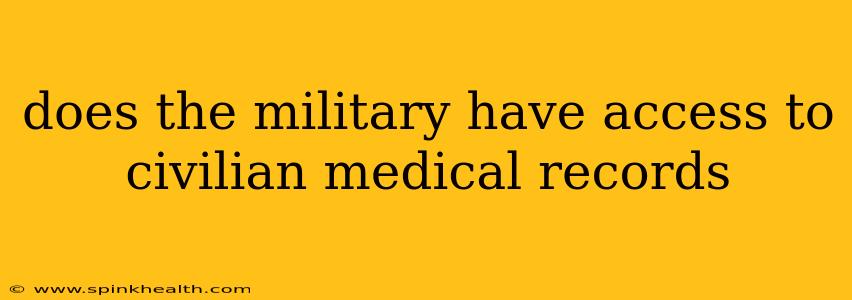Does the Military Have Access to Civilian Medical Records? A Deep Dive into Privacy and National Security
The question of whether the military has access to civilian medical records is complex, nuanced, and deeply intertwined with issues of privacy, national security, and the law. The short answer is: generally no, but there are exceptions. This isn't a simple yes or no, and understanding the intricacies requires exploring several key areas.
Imagine this: Sarah, a civilian doctor, treats a patient exhibiting symptoms consistent with a rare, highly contagious disease. Simultaneously, a military base nearby experiences a similar outbreak. Could the military access Sarah’s patient records? The answer, as you'll see, depends on many factors.
What are the Legal Protections in Place?
The Health Insurance Portability and Accountability Act of 1996 (HIPAA) is the cornerstone of patient privacy in the United States. HIPAA strictly limits who can access Protected Health Information (PHI), which includes medical records. Unauthorized access is a serious offense, punishable by hefty fines and even imprisonment. This applies to both civilian and military personnel acting in their private capacity.
However, HIPAA is not absolute. There are permissible disclosures, especially when they serve a compelling public interest. This is where things get complicated.
When Might the Military Legally Access Civilian Medical Records?
This typically happens under very specific, tightly regulated circumstances, often involving national security concerns or legal proceedings.
1. Court Orders and Subpoenas: A judge can legally compel the release of medical records if they are relevant to a criminal investigation, civil lawsuit, or other legal matter involving national security implications. This is a crucial pathway for access, but the process necessitates a strong legal justification.
2. National Security Emergencies: In situations involving significant threats to national security, such as a bioterrorist attack or a widespread pandemic, the government might have access to information to protect the general population. The legal framework governing this access is often less clearly defined, emphasizing the need for strong oversight and transparency.
3. Consent: The most straightforward scenario is when a patient voluntarily consents to the release of their medical information to military authorities. This might happen if the patient is involved in a military-related matter, such as seeking treatment for an injury sustained during a military exercise.
4. Military Personnel Seeking Civilian Treatment: If a military member seeks treatment at a civilian facility, their records may be shared with their military healthcare providers as part of their ongoing care under established military protocols.
Does the Military Have Routine Access to Civilian Databases?
No. There's no blanket access granted to the military to routinely sift through civilian medical databases. Such access would be a massive violation of privacy and legal protections, inviting the potential for abuse.
What about Data Breaches and Accidental Access?
While not intentional access, data breaches are a significant concern. Any organization holding medical records, including civilian facilities, faces the risk of data breaches. These breaches can expose sensitive information, including PHI, potentially putting it at risk of access by unauthorized parties, including those from military entities.
In Conclusion:
The short and simple answer remains no. The military does not have general access to civilian medical records. However, the various exceptions highlight the delicate balance between individual privacy and national security. The legal protections surrounding PHI are robust, but they must be weighed against legitimate concerns related to public health and safety. Transparency and accountability within government agencies are paramount to ensuring that access to medical records remains confined to appropriate and lawful uses.

